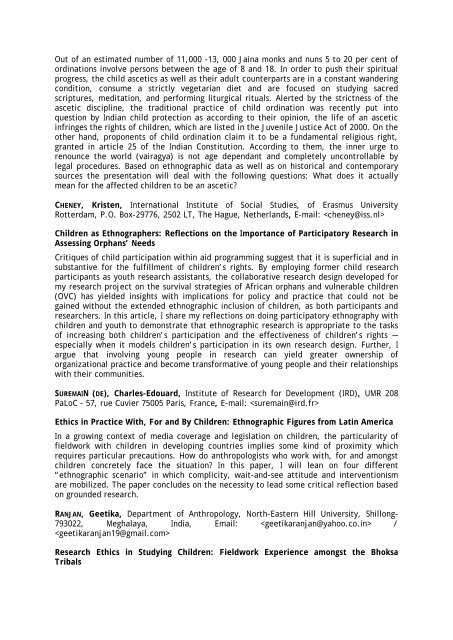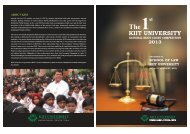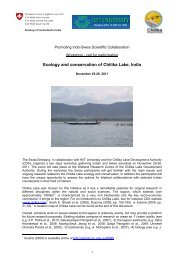PANEL ORGAN - KIIT University
PANEL ORGAN - KIIT University
PANEL ORGAN - KIIT University
Create successful ePaper yourself
Turn your PDF publications into a flip-book with our unique Google optimized e-Paper software.
Out of an estimated number of 11,000 -13, 000 Jaina monks and nuns 5 to 20 per cent of<br />
ordinations involve persons between the age of 8 and 18. In order to push their spiritual<br />
progress, the child ascetics as well as their adult counterparts are in a constant wandering<br />
condition, consume a strictly vegetarian diet and are focused on studying sacred<br />
scriptures, meditation, and performing liturgical rituals. Alerted by the strictness of the<br />
ascetic discipline, the traditional practice of child ordination was recently put into<br />
question by Indian child protection as according to their opinion, the life of an ascetic<br />
infringes the rights of children, which are listed in the Juvenile Justice Act of 2000. On the<br />
other hand, proponents of child ordination claim it to be a fundamental religious right,<br />
granted in article 25 of the Indian Constitution. According to them, the inner urge to<br />
renounce the world (vairagya) is not age dependant and completely uncontrollable by<br />
legal procedures. Based on ethnographic data as well as on historical and contemporary<br />
sources the presentation will deal with the following questions: What does it actually<br />
mean for the affected children to be an ascetic<br />
CHENEY, Kristen, International Institute of Social Studies, of Erasmus <strong>University</strong><br />
Rotterdam, P.O. Box-29776, 2502 LT, The Hague, Netherlands, E-mail: <br />
Children as Ethnographers: Reflections on the Importance of Participatory Research in<br />
Assessing Orphans’ Needs<br />
Critiques of child participation within aid programming suggest that it is superficial and in<br />
substantive for the fulfillment of children’s rights. By employing former child research<br />
participants as youth research assistants, the collaborative research design developed for<br />
my research project on the survival strategies of African orphans and vulnerable children<br />
(OVC) has yielded insights with implications for policy and practice that could not be<br />
gained without the extended ethnographic inclusion of children, as both participants and<br />
researchers. In this article, I share my reflections on doing participatory ethnography with<br />
children and youth to demonstrate that ethnographic research is appropriate to the tasks<br />
of increasing both children’s participation and the effectiveness of children’s rights —<br />
especially when it models children’s participation in its own research design. Further, I<br />
argue that involving young people in research can yield greater ownership of<br />
organizational practice and become transformative of young people and their relationships<br />
with their communities.<br />
SUREMAIN (DE), Charles-Edouard, Institute of Research for Development (IRD), UMR 208<br />
PaLoC - 57, rue Cuvier 75005 Paris, France, E-mail: <br />
Ethics in Practice With, For and By Children: Ethnographic Figures from Latin America<br />
In a growing context of media coverage and legislation on children, the particularity of<br />
fieldwork with children in developing countries implies some kind of proximity which<br />
requires particular precautions. How do anthropologists who work with, for and amongst<br />
children concretely face the situation In this paper, I will lean on four different<br />
“ethnographic scenario” in which complicity, wait-and-see attitude and interventionism<br />
are mobilized. The paper concludes on the necessity to lead some critical reflection based<br />
on grounded research.<br />
RANJAN, Geetika, Department of Anthropology, North-Eastern Hill <strong>University</strong>, Shillong-<br />
793022, Meghalaya, India, Email: /<br />
<br />
Research Ethics in Studying Children: Fieldwork Experience amongst the Bhoksa<br />
Tribals
















